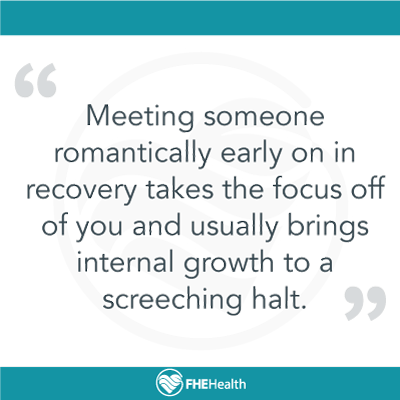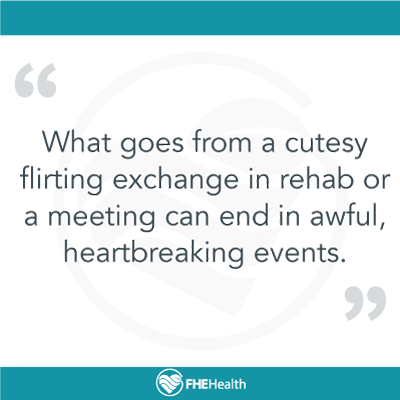
Chances are, if you have ever been to drug rehab or sat in an AA or NA meeting, you have heard the magical advice of, ‘wait one year before getting into a new romantic relationship.’. What people always seem to forget to mention when they drop that little pearl of wisdom is that you should be doing hard work on yourself in that year of recovery. That’s a huge problem.
Another problem is the one-year line is something people snicker at after hearing at a meeting. It’s not taken seriously. Truth be told, early recovery relationships send many people out of recovery and back into active addiction. I’m even willing to say it can be a significant cause for overdose and death.
I’ve been sober for years and worked in the treatment industry for years; I have seen countless ‘love at first sight in the detox med line’ stories that have ended up horrifically. I have not seen even one of those relationships end in a happy story, not a single one.
Why though? How could something like that NEVER work out? Well, let’s tackle the topic because it’s not discussed nearly enough.
Early Recovery Has To Be About YOU
 Active addiction can wear people down so much that they completely lose their identity, life skills, essential relationships, pretty much everything!
Active addiction can wear people down so much that they completely lose their identity, life skills, essential relationships, pretty much everything!
As a result of that, when entering treatment and early recovery, there is a tremendous urgency of starting to completely build a new life in every area. It is a daunting task and truly can only be done if the individual is only focusing on themselves.
Meeting someone romantically early on in recovery takes the focus off of you and usually brings internal growth to a screeching halt. The top priority is no longer what I need to work on today about myself, a top priority is seeing him/her, and everything else becomes a distant second.
Early recovery needs to be a period of profound self-discovery. There is massive work and insight that needs to be done; the absolute last thing you want to do is add a new person into your life that creates an enormous distraction. Especially if they are in the same boat as you.
A New Dependency
We all know the feeling of meeting someone new who we are interested in and has mutual interest in us. It’s completely intoxicating; it’s a narcotic drug as far as I’m concerned. There have been studies performed that claim it hits the same parts of the brain as smoking crack cocaine.
Now I’m not claiming that you will get addicted to meeting new people (well, it is a possibility), but meeting someone early on in recovery who is into you can (I’m lying, it absolutely WILL) satiate the exact needs that drugs used to.
 That means that the urgency to change usually vanishes, as you have someone in life validating you and telling you, ‘I love you just the way you are.’ Building relationships with sober supports also becomes extremely secondary since there is a brand-new exciting relationship to focus on.
That means that the urgency to change usually vanishes, as you have someone in life validating you and telling you, ‘I love you just the way you are.’ Building relationships with sober supports also becomes extremely secondary since there is a brand-new exciting relationship to focus on.
Some other risks of an early recovery relationship:
- False sense of happiness, security and fulfillment
- Major codependency
- High relapse risk
- Lack of coping skills learned
- Complacency in recovery
Like all other addictions, being hooked on this feeling has consequences, especially when the honeymoon phase ends. At least one person relapses; the other will try to save them or just join them. I know many early recovery relationships that involved the woman getting pregnant, and by the time she has the baby, the father is gone and back in addiction, or sadly I know many cases the father OD’ed and passed away.
Absolutely devastating, forever life-altering stuff. This is why this topic is so important. What goes from a cutesy flirting exchange in rehab or a meeting can end in awful, heartbreaking events.
The Reality of it All
Of course, when I sponsor men who are in early recovery, the topic of a romantic interest will come up quite often. What I do is bring them to the Reality of what they are talking about. I will mention the insecurity and anxiety that comes storming along if this love interest doesn’t respond to text messages. How will they react if they see this person talking to other guys?
My favorite question to ask is,’ If you had a son/daughter, would you want them dating you.’ That one is always an eye-opener.
I can give great insight into the topic because, obviously, I was in early recovery at one point. I can recall how insanely delusional I was. My ego was so inflated from having a few months sober that I legitimately thought I was the biggest catch in South Florida, while I lived in sober living without a job and mom was still covering the rent.
I am so grateful for the men I surrounded myself with who made it clear to me to do step work, connect to a higher power, have a spiritual experience and then begin to look into the world of dating. I got into my first relationship with about ten months sober (oh no! I broke the rule!). The girl had about a year more than me in recovery.
I had gone through the step work and been transparent about it all with my sponsor, leading to me getting into a serious relationship. Was it too early for me? Probably, but I had that spiritual change occur and had put in the footwork. I was a different man than I had been leaving treatment. Once that relationship ended 18 months later (I got dumped), I still had the tools to deal with it because I had kept up with my recovery because there were already good habits in place.
Do you get what I’m saying? I hope so.
Does that mean the breakup was easy to deal with? Not a chance, it was very difficult swallowing that pill, but I made it through.
I always point out to single people in early recovery that if they can stay single and learn to be completely content with it, they are untouchable. No one can affect their day, and you get to truly learn about self-love and self-esteem. We are talking about life-changing invaluable stuff here.
I’ve made the strongest points that I can on this topic. The best advice I have for those early in recovery with this topic is to have a sponsor you can be completely open with. Having a sponsor you can talk to about potential relationship risks you have can get you to deal with it the right way and not ruin your life.
Once you become the person you always wanted to be, you will discover what kind of partner you want to have in life. Before that happens, keep away from the temptation and remind yourself of why you are keeping away. It will pay in dividends in the long run.






